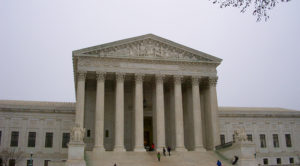A small number of Baptists are among more than 700 individuals joining a brief filed July 3 asking the United States Supreme Court to declare that federal civil rights law prohibits job discrimination against gay and transgender workers.
The individuals join leaders of The Episcopal Church, United Church of Christ and two Jewish groups “who affirm religious liberty, human dignity and equal rights,” according to the friend-of-the-court brief in three cases combined in oral arguments before the Supreme Court scheduled Oct. 8.
More than 40 amicus briefs – legal documents filed by non-litigants with a strong interest in the final outcome – were submitted in time for Wednesday’s deadline for arguments that Title VII of the Civil Rights Act of 1964 prohibits discrimination on the basis of sexual orientation or gender identity.
 Opposing briefs contending that Title VII safeguards barring discrimination based on race, color, religion, sex or national origin do not extend to LGBT persons are due Aug. 23.
Opposing briefs contending that Title VII safeguards barring discrimination based on race, color, religion, sex or national origin do not extend to LGBT persons are due Aug. 23.
Wednesday’s brief in two discrimination cases by gay men and one by a transgender woman fired as a funeral director after informing her boss of her plan to transition from male to female anticipates counter arguments that requiring equal treatment for transgender workers could infringe on the religious liberty of the employer.
“These arguments confuse true freedom of religious exercise with an extravagantly expanded freedom that none of us possess to be free from any offense or contradiction to our sensibilities (religious or otherwise) while functioning in the public sphere of a pluralistic society,” the filing contends.
The faith leaders also contest what they call a false dichotomy between religion and the transgender experience.
“Personal religious views are entitled to the utmost respect, but do not provide a license to disregard neutral civil rights of general applicability,” they say. Furthermore, “within the diverse panorama of American religious thought, a large and growing portion of the religious community welcomes, accepts and celebrates LGBT individuals and rejects the idea that they should be subject to discrimination based on differing religious views.”
Two signers identify their religious affiliation as Southern Baptist.
Miguel De La Torre, professor of Social Ethics and Latinx Studies at Iliff School of Theology, got his M.Div. degree from Southern Baptist Theological Seminary and served as ordained pastor of Goshen Baptist Church in Glen Dean, Kentucky, in 1993-1994.
David Key, founding pastor of the multi-denominational Lake Oconee Community Church in Athens, Georgia, earned both the M.Div. and Ph.D. at Southern Seminary in Louisville, Kentucky. Key formerly worked as director of Baptist studies at Emory University’s Candler School of Theology in Atlanta and is a former board chair of the Association of Welcoming and Affirming Baptists.
Signers identifying with the Cooperative Baptist Fellowship include Scott Stearman, pastor at Metro Baptist Church in New York City, and Chuck Queen, pastor of Immanuel Baptist Church in Frankfort, Kentucky.
David and Nancy Gunn, respectively pastor and minister of worship at The Church at Cactus in Peoria, Arizona, added their names to the list. The church aligns with both the CBF and AWAB.
Pamela Muise, a newly commissioned CBF church planter who serves as pastor of Remnants Church in in Myrtle Beach, South Carolina, is also among clergy supporting the LGBT litigants.
The Southern Baptist Convention, the nation’s second-largest faith group behind Roman Catholics, condemns homosexuality and has removed churches for failure to toe the line.
The CBF, a group started by moderates who separated from the SBC in the 1990s that today claims about 1,800 churches, views LGBTQ inclusion as a matter for the local church but discriminates against gay applicants in some denominational positions.
The Alliance of Baptists, an earlier and smaller SBC breakaway group, affirms “without fear or shame the complexity and diversity by which humans made in God’s image experience sex, gender and sexuality” and “the multiple ways we express sexual lives marked by love, justice, mutual consent and pleasure.”
Signers of the amicus brief listing their affiliation as Alliance of Baptists include Jill McCrory, pastor of Twinbrook Baptist Church in Rockville, Maryland, and Twinbook’s assistant minister Deborah Vaughn, along with Michael Gregg, senior pastor of Royal Lane Baptist Church in Dallas, a congregation kicked out of the Baptist General Convention of Texas for ordaining gay deacons in 2010.
The brief argues that permitting a religiously based “anti-transgenderism” to shape civil rights enforcement would “both enshrine religious beliefs in the law and implicitly privilege some religious viewpoints over others.”
“Amici submit that the best way to ensure all people retain the First Amendment right to speak, preach, pray and practice their religious beliefs with respect to sex – including sexual orientation, transgender status and sex stereotyping – is by keeping the state neutral with respect to such beliefs,” according to the brief.
Previous stories:
Supreme Court to hear three cases pitting conservative religious views against LGBTQ rights
AWAB leader among clergy, groups, speaking up for fired transgender mortician
Recent related commentary:
When a transwoman served me communion
